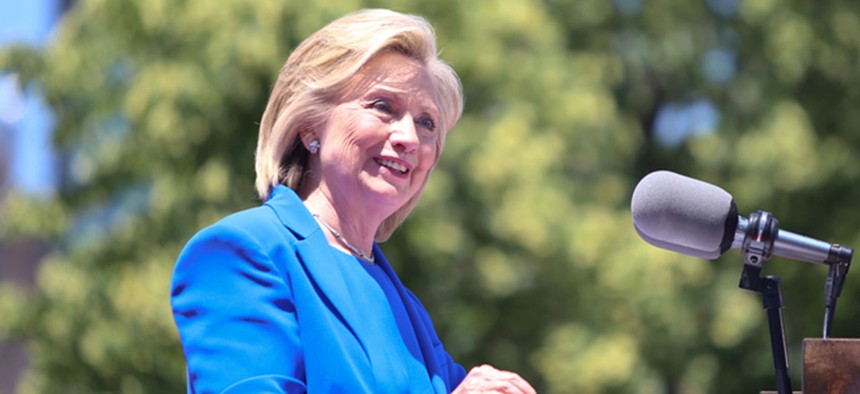
a katz / Shutterstock.com
What We Talk About When We Talk About Clinton's Accomplishments
A campaign centered around the former State Department chief's long track record seems unable to detail what that record includes.
Of Carly Fiorina’s many zingers Wednesday night, the one that offers the best preview of the general election was this: “If you want to stump a Democrat, ask them to name an accomplishment of Hillary Clinton.”
Politico Magazine put that question to the test, and found a slew of Democrats with ready responses. But Fiorina’s quip is like many great political slams—although not factually airtight, it points to a broader truth. The Clinton campaign hasn’t solved the problem of finding a way to communicate just what it is that Clinton has accomplished—particularly during her most recent role as secretary of state, but also in the earlier stages of her career.
The folks Politico canvassed had no shortage of answers, but some are rather thin. Bill Burton, a former Obama aide, cited her “women’s rights are human rights speech,” given 20 years ago; “her role in killing Osama bin Laden” (a nebulous answer, though it’s true she counseled in favor of the raid); and an even vaguer “management of the State Department.”
The multiplicity of answers may reveal the trouble: No one or two accomplishments rise to the top. (The most commonly cited answer is marshaling sanctions against Iran, an essential prerequisite for the nuclear deal that followed, and for which John Kerry has claimed most credit.) Clinton herself has struggled with the question. Last year, when asked what her proudest accomplishment as secretary was, she came up tongue-tied: “I really see my role as secretary, and, in fact, leadership in general in a democracy, as a relay race. I mean, you run the best race you can run, you hand off the baton.”
Fiorina has become the Republican Party’s chosen messenger on these issues in part because it seems less politically risky to have a woman attacking Clinton than a man. Her attack does force a reckoning with Fiorina’s own record, which includes no public offices, just a widely panned tenure as CEO of HP.
Jamelle Bouie argues that this question is beside the point. “Few of the people who get to presidential politics do so on the strength of a signature accomplishment,” he writes on Twitter. “What gets them there is ambition, political talent, a constituency, and the ability to capitalize on & respond to the wants of party actors. I'll put it this way: What was Abraham Lincoln's greatest accomplishment before becoming president? FDR's?”
Accomplishments before reaching the White House may have little connection with a president’s success—hi, President Truman!—but as a matter of politics, this line of questioning can’t be so easily dismissed. Lincoln and FDR each had the advantage of running for office against the status quo at a time of national crisis. (And they did have accomplishments.) The U.S., despite the many citizens who say the nation is on the wrong track, isn’t facing a new Civil War or Great Depression at the moment.
And Clinton’s entire campaign is built on the premise that experience and accomplishments matter. Unlike charismatic candidates who have campaigned on promises of change—Barack Obama, Ronald Reagan—Clinton mostly stresses her long track record and her steady competence. (Not to mention that she used Obama’s short record in the Senate against him in 2008.) That makes articulating her accomplishments all the more pressing, and her struggles to do so all the more glaring.
Another complaint is that the question is out of line, as Elias Isquith suggests. This argument can’t go very far—how does a campaign expect to run on its record without talking about its record?—but there’s an intriguing gender component to the question. As my colleague Yoni Appelbaum reported this summer, Senator Amy Klobuchar argues that female candidates are more likely to run on emphasizing their own record and specific goals they want to accomplish. One reason for this may be that women, facing a more challenging path through the political process thanks to gender bias, feel that their best bet is to use specifics, which male candidates can sometimes get away with omitting. Many other women simply self-select out of electoral politics.
Clinton’s own track record in some ways conforms to this template, but with a twist. Some ambitious legislators aim to pass plenty of impressive-sounding but ultimately low-impact bills, thus giving them a nice record to brag about. Clinton has tended to privilege process over discrete items. Her colleagues in the Senate—many of whom were initially skeptical, viewing her as a celebrity politician on the make—tended to come away impressed with her commitment to low-profile but important issues and to keeping her head down and working with colleagues. At the State Department, she focused on improving management and coordination, which was by many accounts badly needed.
But even as competent management may be an essential skill for a successful president, it’s hard to convey to voters, which is likely why she seized on the mileage she traveled as secretary: It’s a concrete figure. (One reason thecontroversy over her emails and the general disarray of her campaign are so potent is not just that they place her on the defensive, but they undermine her efforts to to make an affirmative case for her managerial competence.)
A common line among both Clinton’s supporters and some of the more coolheaded political analysts has been that Clinton may be facing some challenges, but it’s still very early in the campaign cycle. Yet it’s getting later, and 18 months after it was first raised, she still hasn’t found a good answer to this question. Sooner or later, Clinton will have to either come up with a convincing way to explain why her track record qualifies her for the presidency—or else articulate some other rationale.






